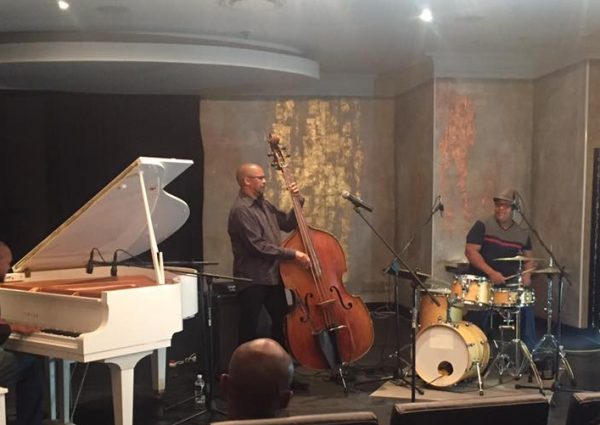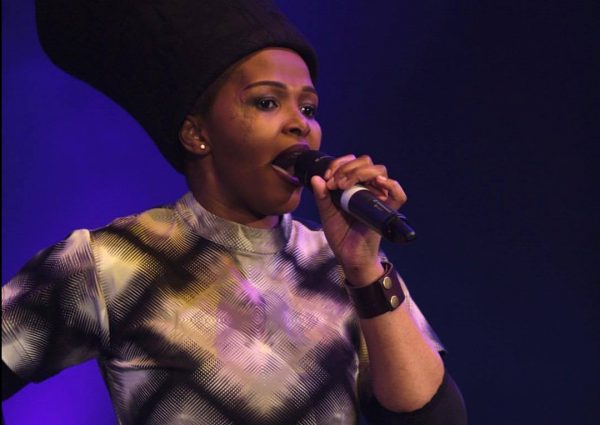In all his greatness, ZOLA did not elevate us higher than the township—and so we left him behind, writes ART STATE Editor Ace Moloi.
“NTOMB’ZODWA,” he screams at the end of the track. It’s one of those songs we’ve come to know him about: compositions that provide all-rounded social commentary. From love lives here to thug life. For Nomthandazo and Nongoloza. Gugulethu and Guluva. His are lyrics that repeat what the hypothetical Gogo Dlamini of Advocate Thuli Madonsela’s humble creation has been saying to her granddaughter. Verses that often make you question Bible verses, pondering as does he: “Kanti owani lomnikelo? Kanti olwani lokholo?” His name is Bonginkosi Dlamini – the one we used to know as ZOLA.
Ntomb’zodwa is a star of the story he is narrating in this song. She is a born-free girl intoxicated by the sub-freedoms that came with political and individual freedom. She doesn’t listen when rebuked. She lives for the dance floor and loves her men just as she does her beer. It’s all good, really—to be young and wild and adventurous and utterly stubborn. Except that Ntomb’zodwa is a teen mother who is reckless with her baby: she doesn’t change the baby’s nappies, and this has gotten to the baby’s uncle.
As is the fictional brother in this song, so is ZOLA: all he wants is for Ntomb’zodwa and her generation to think differently about their future, despite the cruelties of the township; to shine like stars; to make their dreams a reality.
He writes about them in a variety of emotions. He praises them for their unconditional love.
He reassures them that his love for them is lwandle deep.
He is not shy to confess, “Akukho okunye enginakho, ngicel’ ukukunikez’ uthando kuphela.” Even though they walk through the valley of the shadow of death, he is here to urge them, “Don’t cry.”
But for Ntomb’zodwa to be a mother it took a creamy injection from a certain Mdlwembe who needs to know that yamadoda ayipheli—only death brokers peace between men at war. Where is he? Why is he not playing a role in the upbringing of his offspring?
ZOLA’s man is the type to win movie awards for authentic blackness. He is a drunkard who needs no special reason to gulp it all down. He is a self-exiled father. Or a gangster in chief. Wearing ragged pants.
He lives for majita. Perpetually in regret over a self-perpetuated break-up with a loyal woman. Now playing, “Ngizok’linda uzubuye.” He asks of us that when we see her, the ex-girlfriend, we should tell her, “Ngisamkhumbula namanje.”
But when she was in his life, before she left, he never made time for her. When she said, “Mina ngifun’ ukuza kuwe,” he replied, “Ntombazana, bengithe ngizovaya.”
When caught with his hand in the cookie jar, literally, his unequivocal stance was, “She is just a friend. No address. No cell number.”
For many years ZOLA has filled the screens of our TVs with his great nation-building work as a host of ZOLA 7, an inspiring weekly show that solved people’s problems and restored their hope. He was everyone’s hero. He shone like a star for young people in the township. A figure of authority in matters of possibility. Something of a Tupac Shakur whose life preached, “Black child, your dreams are valid.” He could speak the language of the masses.
He looked like a brother from across the street. He humbled himself and redefined what it meant to be on TV. There are many people who wouldn’t have believed in themselves had it not been for ZOLA. In fact, for the years that I spent consciously following the SA art space, no celebrity has ever exploited their influence in favour of the masses like ZOLA did. He birthed the hustling spirit in black youth and mentored artists whose careers could be antiquated before ossifying.
From the early days of his Yizo-Yizo 2 stardom to his Ghetto Fabulous glory, he became something of a kabelwamanong: a shrewd artist, go-getter, performer and inspirational personality whose craft touched people in many ways – and continues to do so, though under a PR spell cast on him by his very own actions and the long arm of the media.
Sometimes I think to myself, “If we as a people could do this to ZOLA, who else shall the Lord commission unto our youth to order their footsteps?”
Of course our hero himself is not without fault; he too played an active role in his premature aging. But there are other factors that I, as a commercially published author, can draw similarities on and therefore interpret his downfall in the context of the need for radical economic transformation in the arts.
At the height of this list is the saddening conundrum of royalties. I call it a conundrum because as an artist you need to be planted in a fully equipped institution that can distribute your work and propagate your brand, and, yet, this means you’re signed into glamorous slavery as a cash cow for the owners of the means of production, only to get crumbs that fall when everyone who matters has eaten.
ZOLA, here as in anywhere else, captures in prominent misfortune the pain of musicians, actors and authors.
It has been reported in the media that his fallout with his boss of Ghetto Ruff Records had to end in the hands of the law, with the big boss crying incitement, and ZOLA demanding his millions. ZOLA signed a recording deal with Ghetto Ruff Records when he was only 20. He was youthful, manipulable and contractually illiterate at the time. It’s only when he lost favour with his boss that he realised that, in his Daily Sun cited words, “There are many songs all over the world I’m part of, which I don’t get royalties for.”
Tragedy befalls everyone, and when it does, it comes in like a flood. Our hero, my hero, was entangled in some domestic abuse scandals. Journalists feasted on him. They turned us against him. He became the man he’d ordinarily sing about in a randomly selected song of his. Or, perhaps, he became himself!
The thing with ZOLA’s Ntomb’zodwa is that she doesn’t become anything else but a rotten fibre of the black society. In his songs, Ntomb’zodwa and everyone that looks like her never graduates with a degree in economics to join one of the largest financial institutions in the land.
She is not part of the growing number of women who weather the storms of patriarchy and misogyny to establish businesses, effect socio-political change and run healthy families.
She cannot even tell a clutch from an accelerator, let alone run a computer programme.
ZOLA’s Guluva character is just as barbaric, uncivilised, immoral, stinking authentically black. He is not someone you can bump into on a university campus to discuss the origins of capital or Black consciousness as an existentialist philosophy.
Guluva is isolated from the core of human affairs and affixed to secondariness. Those of us who have seen him have since ceased to relate to him. He is not here: in the gym, in mega churches, in shopping malls, in bookstores. We forget about him as the forces of greatness propel us higher; we forget about his ghost; about the poet that seared him into our consciousness.
We forget about ZOLA! We turn him into a museum to be visited, but never occupied. His songs become a memorabilia of our dead childhoods and not a tune of our living destinies, just like we pervert Mgarimbe’s Sista Bettina: a song that we love more for its ability to remind us of our vanquished past – and thus our individual upward social mobility – than the magic of the artist himself.
Yes, I feel robbed by ZOLA for not making music that grows with me; for not evolving in his art and social commentary. Yes, I’m somewhat disappointed in him that his characters, though factual in their particular existence, wore a Western, sponsored garment of blackness.
ZOLA stopped to be one of us when we escaped the pangs of hunger. He seems to have limited his creative capacity to the ills of black society, thus alienating ‘other’ blacks who could do with his motivating sound in the Sandton-headed traffic congestion and warm themselves up with his hooks in the colds of their workplaces. They’d love to hear him rap about the need to expropriate the air-con remote without compensation.
If he had given Ntomb’zodwa a career, scores of young women would see themselves in her.
But, in all his greatness, ZOLA didn’t elevate us higher than the township—and so we left him behind … at 7.
I don’t want you to be left behind on what’s in this second edition of ART STATE. So let me begin:
On 12 August 2017, scores of women – and men – at the University of the Free State, South Campus, for another successful WOMEN OF NOTE (WON) Concert. We have packaged highlights of the show for you, which we could harvest thanks to the kind and highly appreciated ticket sponsorship from Sisipho Ngwenyana. Re lebohile.
Keeping up with music, the Free State Youth Orchestra treated us to a soulful session at the Towers of Hope church, here in Mangaung, on Women’s Day. As ART STATE we gave concrete expression to the Biblical saying, “We shall enter Your courts [with a pen, a camera and a notebook in our hands]”
Mangaung hip hop continues to grow by leaps and bounds, and the streets are opening up to it wider and wider. We invited a reputable hip hop connoisseur to review the Rose City Thorns Mixtape by local artists, Naycha and Prime-Eezy. Don’t be left behind—on this and many more.
I wish to close my editor’s note on an appreciative note, necessarily to thank the art-loving and media-consuming community of Mangaung for your feedback, engagement, sharing and mentions of ART STATE in your own spaces.
I’m honoured to introduce to you the second edition of the headquarters of Mangaung art, and I wish you a great read ahead.
Ace Moloi is the Editor of ART STATE. Follow @ArtStateWeb on Twitter.







Valentino
Personally, I have since deleted all the Zola albums I had a few years back. Well apart from having to save space for other things, I had evolved past his music. One should never underestimate the importance of an artist remaining relevant, to move with the times, and grow with his fans. It would be great to have Zola return to our screens or radio sets with fresh material that speaks to the current Black condition.
We certainly can never have enough people who look like us, come from where we do, and speak like us who are also empowering us to “keep on keeping on” and disrupt the status quo with awesome ideas like Art State and the likes.
I still love the fact that he opened our eyes and had the courage to say what everyone else clearly witnessed but were too cowardly to admit back then though.
Big ups for a great edition. I’m certainly holding my breath in hopes that you guys continue to bless us with more relevance as Art State. I’m happy to be a blessee in that case.
Art State
Thank you for the thorough reading and compliments! Indeed, if the masses keep buying the art and attending the shows the artists will keep producing and ART STATE will always be relevant.
Kabelo Chabalala
Amazing work from you and the whole team. Keep us reading.
We will read until we get our land back… the only compensation due will be our well-read brains.
Art State
Thank you for reading and your promise. We are glad we are living up to the promise that we will “write in a way that doesn’t disrespect writing as an art.”